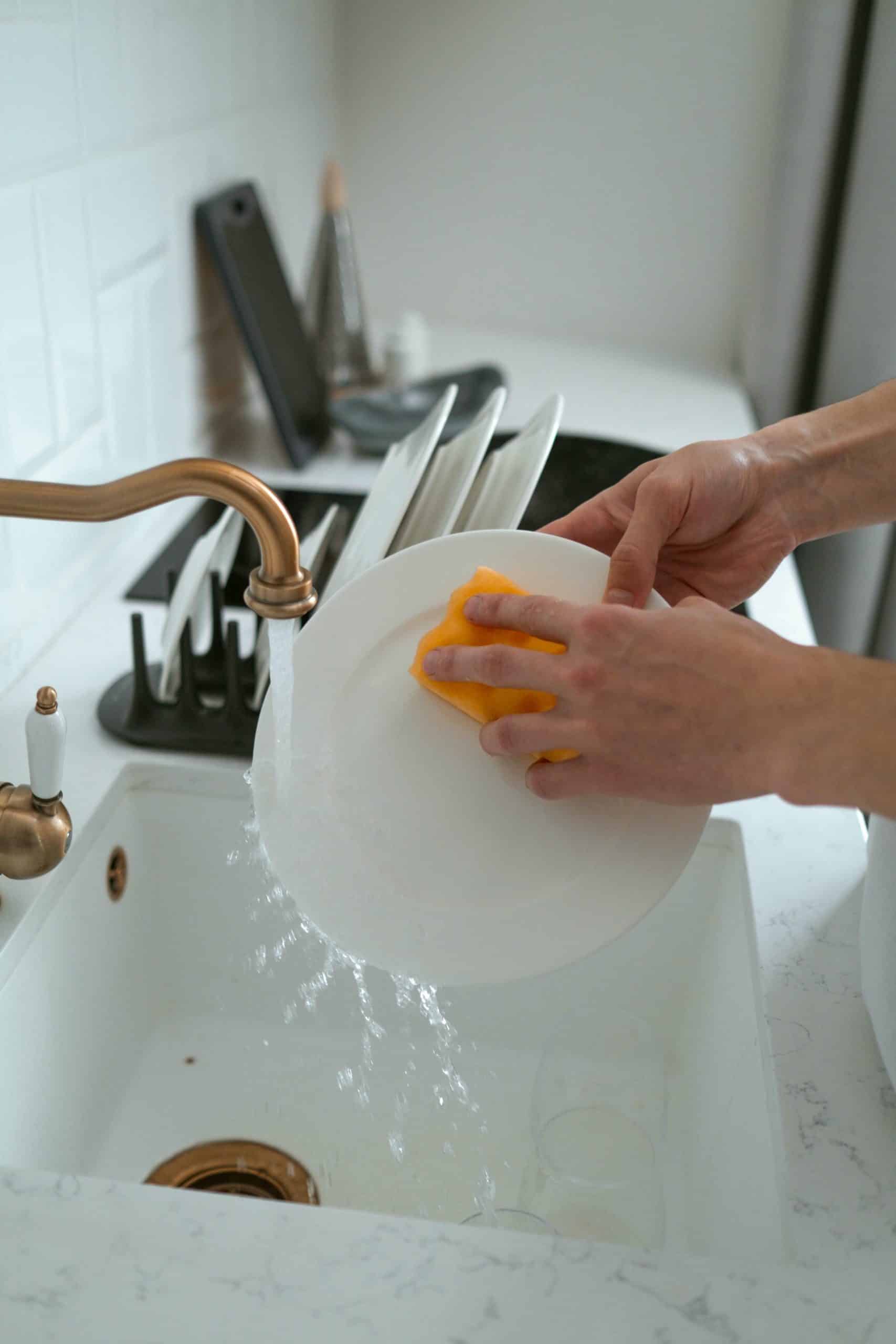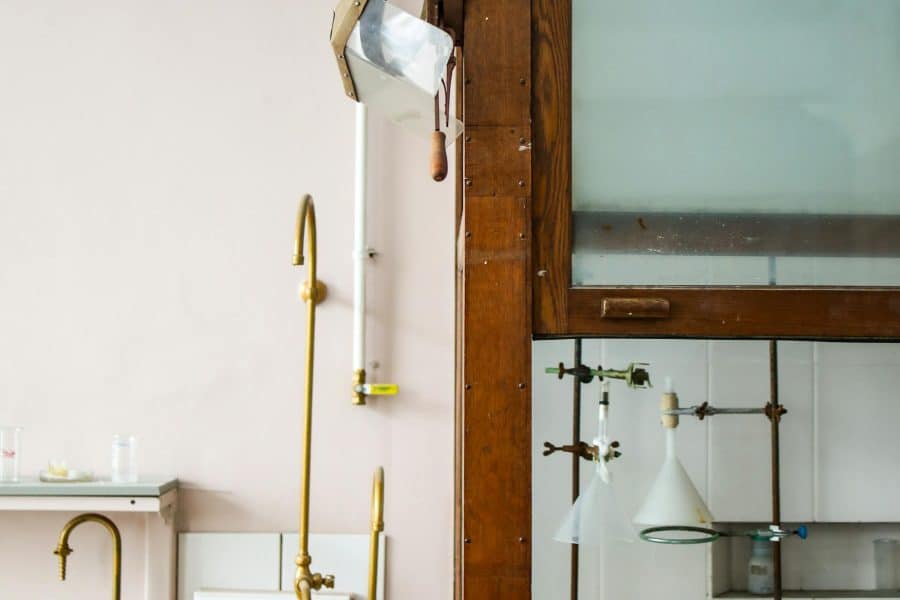A whole house water filter can improve your water quality, but there are crucial things to know before making an investment.
➡ SEE MORE: Water Softener, Tap Water in Las Vegas, Problems with Las Vegas Drinking Water
What is a whole house water filter?
A whole house water filter is a system that cleans all the water coming into your home. It connects to your main water line, filtering water before it reaches any faucet, shower, or appliance.
15 Things to know about whole house water filters
1. Whole house water filters can protect you from chlorine and contaminants
Even after being treated by the city, your tap water can still contain unwanted chemicals like chlorine and chloramines. A whole house water filter acts like a shield, cleaning your water before it flows into any faucet in your home.
Since water quality differs from place to place, we encourage you to test your water to know exactly what needs to be filtered out. You can then pick the right type of filter.
For example, activated carbon filters excel at removing chlorine and organic compounds.
2. A high-grade catalytic carbon filter is a fantastic choice for removing chloramines and hydrogen sulfide
A high-grade catalytic carbon filter breaks down chloramines into harmless substances and gets rid of the rotten egg smell caused by hydrogen sulfide.
For homes with city water that contains chloramines, or well water with sulfur smells, this type of filter is especially useful.
3. Whole house water filters can improve how your water tastes
A whole house water filter can make your water taste better. Many people say they can tell the difference right away after installing one. The water feels cleaner and more refreshing, with less of a chlorine taste or metallic aftertaste (or otherwise), depending on the filter.
Moreover, cooking quality can improve. When you cook with filtered water, there aren’t strange flavors from the tap water getting into your food.
4. A whole house water filter can improve your skin and hair
A whole house water filter helps your skin and hair by removing harsh chemicals and minerals that strip away natural oils.
Depending on the filter, your skin and hair should stay softer and more moisturized. Your hair should also become more manageable, with less brittleness and breakage. The benefits are especially noticeable if you have hard water.
5. A whole house water filter can make your clothes last longer
A whole house water filter helps protect your clothes by removing harsh minerals and chemicals that can damage fabric fibers.
Chlorine and hard water minerals can fade colors, weaken fabrics, and make clothes feel stiff or scratchy.
6. Whole house water filters generally don’t soften water
Water filters and water softeners do different jobs in your home. A water filter removes things like dirt, chemicals, and chlorine. A water softener takes out minerals that make water “hard” and cause buildup in your pipes and appliances.
These systems can work together to first remove the harmful stuff and then remove the hard minerals. If you have both dirty and hard water, a combined system might be your best choice since it handles both problems at once.
7. The size of your house will determine filter capacity
Most filter companies recommend filter sizes based on the number of bathrooms in your home, as well as how many family members live there. The goal is to make sure your system can handle peak times when multiple people are using water at once.
Think about how much water your family uses during your busiest times, like in the mornings when everyone’s getting ready. A filter that’s too small won’t keep up with your needs and might reduce water pressure, while one that’s too big wastes money and space.
A small house with one bathroom might only need 7 gallons per minute, while a larger home with multiple bathrooms could need 15 gallons or more.
8. Whole house water filters can help protect your appliances and more
When water is filtered, it removes dirt and minerals that can build up inside appliances. This means they will work better and not break down as often.
Clean water also keeps your faucets, showerheads, and pipes from getting clogged. When water flows freely without mineral buildup, your appliances don’t have to work as hard.
9. More filtration stages mean more contaminants can be removed
Think of each stage of your whole home water filtration system as a net that catches different things. A simple filter with one or two stages can catch basic stuff like chlorine, which might be all you need if your water is mostly clean already.
If your water has more serious problems, you’ll want more stages of filtering. The best way to know how many stages you need is to test your water first. This shows you exactly what needs to be filtered out.
10. Whole house water filtration systems use different types of filters
Just to reiterate: Whole house water filters come in several different types, each of which is designed to clean water in its own way. For example, one type uses an activated carbon filter to remove chlorine and organic compounds, including VOCs.
If your water has specific problems, you might need a more specialized filter. Most homes use a combination of filter types to make sure their water is as clean as possible.
11. Whole house water filters have different flow rates
Flow rate, which is measured in gallons per minute (GPM), indicates how fast water can move through your whole house water filtration system. If your filter’s flow rate is too low, you’ll notice weak water pressure when multiple people use water at once.
It’s usually better to pick a filter with a slightly higher flow rate than you think you need. As mentioned, a small house with one bathroom might only need 7 gallons per minute, while a larger home with multiple bathrooms could need 15 gallons or more.
12. Filter maintenance varies by model
Different filter systems have their own maintenance schedules, with some needing changes every few months while others can last for years. It really depends on the product, the manufacturing company, and what you’re trying to achieve. There is a huge range of possibilities.
You can tell when your filter needs attention if your water pressure gets low or if your water starts tasting or smelling funny. Taking care of your filter system is important. It keeps your water clean and helps your system last longer. It’s cheaper to maintain your filter than to fix big problems later or buy a whole new system.
13. System lifespan depends on water quality and usage
If your water contains lots of sediment or minerals, your filter has to work harder and might not last as long. Similarly, a large family that uses more water will need to replace their system sooner than a smaller household.
Proper installation and upkeep will help your system last longer.
14. Water temperature affects filtration efficiency
The temperature of your water affects how well your filter works. Cold water is thicker and moves more slowly through filters, which means you get less filtered water.
Warm water usually filters better, but very hot water can damage your filter. Most filters work best when water is at room temperature.
15. Whole home water filters need professional installation
Whole house water filters should generally be installed by a professional, even though some homeowners try to do it themselves. The installation involves cutting into your main water line, and mistakes can lead to leaks, water damage, or a system that doesn’t work properly.
A professional installer knows how to choose the right location, install the system the correct way, and follow local plumbing codes.
A Fair Warning about whole home water filters
Just a fair warning: A whole house water filter comes with pros and cons, which homeowners should consider before buying. For example, the system needs enough space for installation. This means you’ll need to dedicate a significant area near your main water line for the filter system. A high-grade whole home filter also costs more upfront than basic filters.
But it also provides clean water to every tap in your house, protects your appliances, and can improve everything from your morning shower to your cooking water.
Here’s the real warning, though: Once you experience the difference of having pure, filtered water throughout your entire home, you’ll probably never want to go back. Most homeowners find that having clean water from every tap becomes a new standard of living they can’t imagine giving up.
Conclusion
A whole house water filter is a smart investment that can make a big difference in your daily life, from better-tasting water to longer-lasting appliances. While there are some important things to consider, most homeowners find the benefits far outweigh these factors.
Ready to improve your home’s water quality? Contact Water Quality of Las Vegas for a free water test. Our experts will help you choose the perfect filter system for your home.
Disclaimer: The benefits of a whole house water filter system vary based on several key factors. The quality of the filter system you choose, the company you purchase from, and the specific type of filtration all play important roles in your results. Not all water filters are created equal – a basic sediment filter won’t provide the same level of filtration as a multi-stage system with advanced features. For best results, work with a reputable company that can help match the right system to your specific water quality needs.





